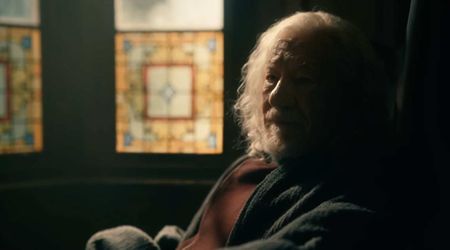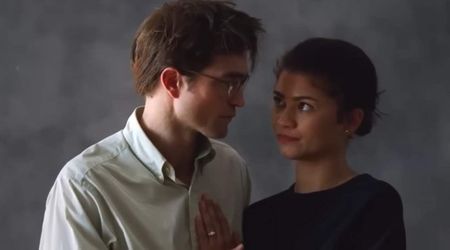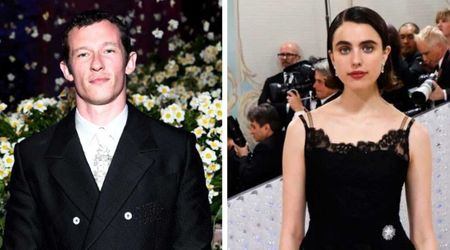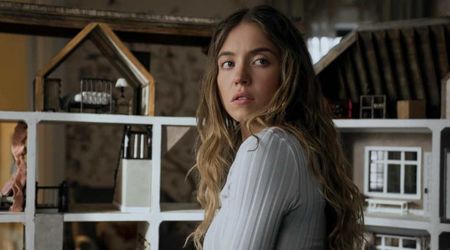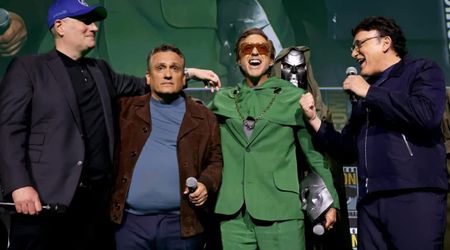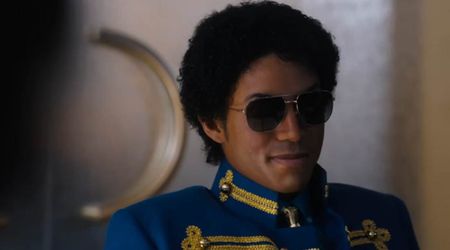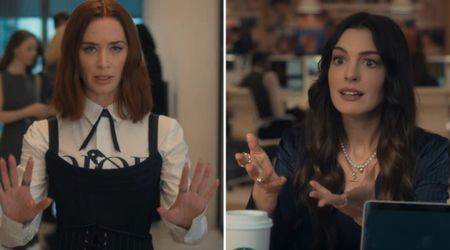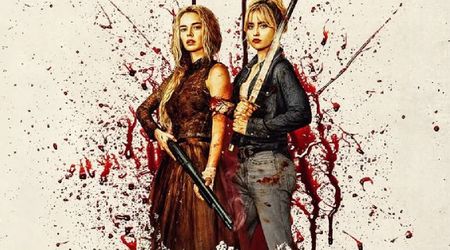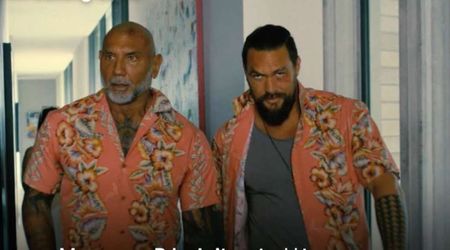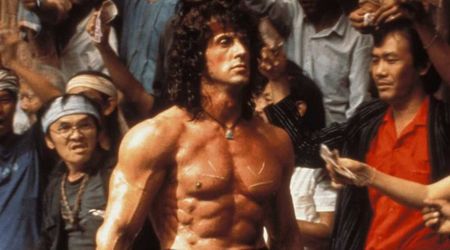Through the eyes of a zombie: How the 'Cargo' directors changed the post-apocalyptic thriller with their film

At a time when zombie movies have come into their own as a genre, it's now commonplace to see one zombie flick released every other month. However, most fall prey to the same old tropes; the dystopian metropolitan city, the undead who have an inexplicable taste and craving for human flesh and, of course, the ominous shots of a sky that is perpetually overcast. 'Cargo,' however, tries to rise above the crowd and do something different.
The first directorial foray for pair Yolanda Ramke and Ben Howling, 'Cargo' made history this past week on May 18 when it became the first-ever Australian Original Netflix movie. Adapted into a full-feature from a short film of the same name that went viral in 2013 after its premiere at the Tropfest festival, the film stars Martin Freeman of 'Sherlock' and 'Fargo' fame who plays the titular role a man trying to find a safe haven for his daughter in a post-pandemic Australia.

'Cargo' has been lauded for its drop-dead cinematography and for its fresh take on a tried-and-tested genre. The film boasts of an undercurrent of social messages and other relevant issues, not to mention the invigorating storyline and a pitch-perfect closure. Yolanda and Ben spoke with Meaww and explained how a seven-minute short film metamorphosized into the film it is today.
They might have differing opinions on many issues but both agree that they had never conceived that their short film would one day make it to the big screen. "No, no, definitely not," they said.
"At the time, we were just looking at a project for Tropfest and they had a strict seven-minute running time for films. We thought it was an awesome challenge to try and tell a story in such a short time frame because it forces you to be economical. And we thought we would like to try our hand out at the zombie genre and have a bite at it," said Yolanda.
Asked whether the virality and popularity of the short film which garnered 14 million views on YouTube helped influence their decision in wanting to adapt it to the big screen, she replied in the affirmative: "Initially, our thinking did not go beyond the short film; we were only hoping to get it to that particular festival that had such a large audience because it was a great way to get eyes on it."
"Then, it ended up online and quickly gathered traction. Soon, people were reaching out to us from the US and agents and producers expressed their interest in seeing it made into a feature film. That is when we started thinking, 'Oh, wow. This is an opportunity to think of a broader story and a new version of it.'"
'Cargo' is unique in the sense that it forgoes the traditional hack-and-slash violence that accompanies zombie apocalypse movies. A 'zombie' movie by virtue of nothing more than its premise, it instead focuses on some of the visceral aspects of human nature such as communication and socialization. Ben admits that the idea to take that direction was conceptualized during the ideation process, right at the beginning.
"The early part of the filming sessions was just trying to unpack what we had already seen in zombie movies and what we haven't seen yet. We knew we were going to have the father-daughter angle from the short film, but the question was 'What is the most real world we can have everyone functioning in?'," he said.
"Everyone has a habit of falling back on your mobile phones when in trouble. So, we wanted to show how much someone would struggle if we took away their phones and how they would respond and survive. With certain characters, we also wanted to portray how they fell back on basic skills of living off the land but still refused to let go of the Western world and materialism."
Ben also addressed the inclusion of the country's aboriginal people in the movie and why they were given such a significant role: "The indigenous point of view made a lot of sense. On a practical level, a lot of these cultures in the world have a rich history of living off the land and they are no different. A lot of their practices and hunting techniques — such as their usage of clay paint masks to throw their scent off from animals while hunting — are very effective and practical."
The setting of the movie immediately catches the eye as well. Shot in the gorgeous backdrop of the Australian Outback, 'Cargo' does a stellar job of conveying the sense of foreboding, loneliness, and isolation that the characters often feel. Yolanda explains that the countryside location was set in stone from the beginning because of how they sidelined the zombie element to the fringes of the story and how they wanted the story to play out.
"We knew it was important to keep a sense of tension around the film," she said. "We had this character who was on a ticking clock and had hours to find somebody to take his daughter and the obvious way to escalate the stakes was to put him in a place where there's nobody around. This instantly makes his quest to find help a lot harder. The aerial shots of the man being an ant in a vast landscape also served to emphasize how lonely it was." she continued, adding that the setting also helped them incorporate the indigenous people smoothly into the story.
Another aspect that stands out is how, in 'Cargo', the transformation into a zombie is not shown in the typical aggressive fashion but through the use of suggestive imagery — be it the stills of sticky sap, pools of blood, or the illogical urge to stick one's head in the sand. The filmmakers made a conscious decision to depict the victim's perspective instead of employing a third-person approach. And it works wonders as it makes the audience feel empathy in place of fear.
Yolanda gave us the lowdown on why they decided to go down that route: "We wanted to follow a character as they slowly go through this process of their own body betraying them. I think that was a horrifying idea and also it just naturally provided this ticking clock element in the film that we could have in the background driving that character forward and giving it a set timeline to unfold the story in," she said adding that it was a practical way of thinking and something she had not seen in the genre before.

Despite being what many would term an Indie film, Martin Freeman's casting in the leading role intrigued many. Boasting of a CV that includes roles in the UK version of popular sitcom mockumentary 'The Office,' crime drama 'Sherlock,' and films such as 'The Hobbit' and 'Black Panther,' his inclusion was considered to have been a sort of coup. His impeccable performance as father Andy Rose shows why. Ben recalls how the decision to contact him was more by chance than anything else.
"Martin was always on the top of our list when it came to potential leads. As we were writing the script, I was just coming off like a Sherlock binge at the time," he chuckles. "We were aware that we were seeing interesting choices in the roles he was taking and reached out to his agent with the script."
But roping in such an accomplished actor was not a straightforward process. Ben says that they were initially informed Martin was too busy to take on a leading role in a feature film but that their proverbial shot in the dark was vindicated when the actor went through the script and became interested in the mooted father/daughter dynamic the story revolved around.

Yolanda gushes that the experienced actor was a pleasure to work with and a calming presence on the sets, describing how he took the young Simone Landers (Thoomi) under his wing: "It was an interesting dynamic because Martin has about 20 years of experience and, for Simone, it was her first ever acting role. So, they were polar opposites in terms of what they're bringing into the project"
"What was wonderful for us was the fact that, on screen, those characters develop a relationship and a rapport and a bond through the story, and a similar kind of thing happened off screen as well with Simone and Martin," she said.
She continued: "Martin was very aware of how important it was for the story, so they did develop a friendship and he really did take her under his wing. A lot of the times he would help her out in the scenes and it made our job a lot easier. As a director, a lot of the times you feel that you kind of have to step in and offer direction but you don't need to do so when the actors are discussing it together. You don't want to break that focus and you can feel that they're going absolutely in the right direction."

Initial impressions suggested that Anthony Hayes' character, Vic, who was practically the polar opposite to that of Martin's and Simone's, was covertly racist. He does, after all, target the aboriginal people and use them as bait against the undead. We were curious whether that character was expressly written for such a purpose, to expose a casual racism problem the country still faces today, but Ben suggests it's unfair to paint Vic with such broad strokes.
"We all know of our country's shocking history with the indigenous people, but, no, Vic was not intentionally racist and targeting aboriginal people. He was casually racist but it was more of a battle between them and him because he was trying to preserve his old way of life in the fracking and mining plants and the aboriginal people are trying to oppose it and shut it down," pointing out that, while he does take them prisoner, he offers the same treatment to Martin's character as well.

Despite their recent success, the pair remain humble. Asked whether there was anyone that they felt the movie would not be possible without, Yolanda jokes that they could sit there for hours rattling off names. She seemed genuinely thankful for the experienced and hardworking crew who gave it all behind-the-scenes but points out to the efforts of producers Kristina Ceyton and Samantha Jennings in particular.
"The film definitely would not have happened without those guys. They came on board from very early on and were on the project for four years as we developed it. They gave us insightful script feedback, handled the film's financing, and worked their butts off to help us have the opportunity to tell our story," she said, also thanking cinematographer Geoffrey Simpson, costume designer Heather Wallace, and editor Danny Cooper for their efforts.
We talked with the directors on May 18, a day that arguably should have been the busiest of their lives with the impending release of 'Cargo.' Understandably, we couldn't keep them forever.
The film is now streaming on Netflix, and we're confident that whatever project the pair undertake next will boast of the deft touch that made 'Cargo' such a thrilling and exhilarating watch.

